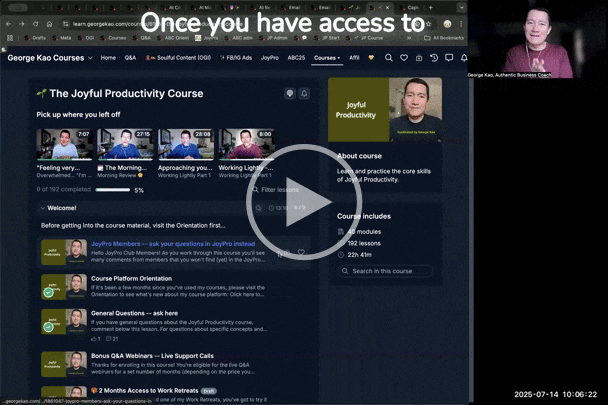- Orientation
- BizPlan
- BizPlan25
- Authentic Speaking
- Authentic Market Discovery
- Create Aligned Offers
- Joyful Productivity (Course)
- ✨ Authentic Outreach (AO)
- Joyful Pro
- Blog-to-Book
- 🚀 Course Creators
- 🖼️ Your Signature Framework
- 🙋 Effortless Yes
- 🌈 Energy Signature
- Meta Ads (FB / IG Advertising)
- 📱 Instagram Mastery
- 🎤️ Interview Mastery
- Launch Your Group Program
- Netcaring
- 🦸🏽✍🏽 Soulful Content (OGI)
- Substack Course
- "What do you do?"
- 🎬 YouTube Mastery

Hi All!
I'm grateful to be able to teach courses and run group programs to help people grow their authentic business and joyful productivity.
My social media links:
Instagram: https://www.instagram.com/geokao
Youtube: https://www.youtube.com/georgekao
LinkedIn: https://www.linkedin.com/company/georgekao
Facebook: https://www.Facebook.com/GeorgeKaoCommunity
Twitter: https://twitter.com/georgekao
Medium: https://georgekao.medium.com
- Everything
- Excluding groups
- Soul Gym Content Creation
- ABC 2023
- 2024 ABC Masterheart
 8:55
8:55
Why "watch" my courses? Simply chat with it -- get AI to be your personal tutor :)
You can save tons of time -- and make my course material personally applicable to you -- by chatting with the Ai bot that's connected to any of my courses :) The above video shows you how!
 2:29
2:29
The power of commenting
Under every lesson in my course platform, there's a place to comment. If you don't see a place to comment under a particular lesson, it means you're either logged out, or not yet enrolled in the course.
- Summarize this thread
- Copy link
Yes!! I really love how this course has a comment section and it actually used quite commonly, from what I've seen so far. I've taken quite a few courses and this is the most engagement I've ever seen at the course level. Bravo!
- Summarize this thread
- Copy link
@Sharilee aww thank you sincerely for saying that 😊 I'm grateful for engaged students like you 🙏🏼🧡
 5:59
5:59
Ways I dislike -- and ways I like -- for you to ask me questions 😅
Thank you for engaging with my courses! I truly am grateful to be able to support you, my students and clients, in growing your authentic business. It’s what I love doing the most. 🤗 At the same time, since I'm (mostly) a solopreneur, I also need to keep healthy boundaries with those I'm supporting... so I hope you will keep these in mind... Ways I dislike getting questions: Social media private messaging -- whether it's FB messaging, IG dm's, Twitter, LinkedIn etc... I really dislike getting questions through those channels because it's hard to organize messages in those places. Kindly refrain from asking me questions via social media direct messages. Email -- I don't mind getting questions via email if it's enrollment-related: something you need to clarify before signing up for my courses or programs. If it's questions related to the content of my courses, e.g. concepts, exercises, feedback requests etc, please use one of the following methods... Ways I love to receive your questions: Q&A calls -- this is my favorite way to engage with you and take your questions! There, you can ask me anything 🤗 Even if you’re not clear about your question, coming to the call will likely give you inspiration and ideas! You can then ask me about specific concepts, or how to apply them to your business. We can troubleshoot what's not working, or address specific challenges you're having. You can also seek my feedback about anything including your strategy, website, content, offers, or anything else. Click here: George Kao Q&A Calls. Comments under Lessons -- if you can't come to my Q&A calls or would love to get an answer sooner, find the course (George Kao Courses) related to the topic of your question. Go there, find the related lesson, and then comment underneath. This keeps the Q&A focused on a specific topic. I'll do my best to respond to your question within a few days. Members of ABC/MasterHeart -- I'd love for you to post your questions in our private forum, so that you can receive responses from other members. Your questions will also help me prepare for the next ABC Q&A calls. Even if you can't post your questions, you can still come to the Q&A calls and ask directly. Thank you for understanding! 🙏🏼 As business owners / service providers we each need to find a way to keep healthy boundaries in our work! I hope this page/video gives you some ideas for how to maintain a good relationship with your own audience as well. 😊 New as of 2025 -- before you ask me anything, consider asking my Ai chatbot! Whatever course you have access to, my Ai is also trained on that course material, and can coach you step bys tep about the course material. Click here to see how that works
- Summarize this thread
- Copy link
I love this video! And I love this way of channeling questions for highest benefit and lowest drag. Thanks for the clarity and the great processes.
- Summarize this thread
- Copy link
@Christine Stump thanks for your kind comment 🤗
- Summarize this thread
- Copy link
Thanks for discussing an important topic that keeps your work load sustainable! How do the Q/As work for i-JoyPro members - as you mentioned clients in ii-ABC/Master I am assuming there are two categories (i and ii) for Q/A access.
- Summarize this thread
- Copy link
@Ambereen Safiullah thanks for asking -- as a JoyPro member you can ask any questions during our weekly JoyPro trainings (the last 15-20 minutes of every call, at this point usually have no questions! so I welcome yours) or... as a member you also have access to my monthly ask-anything calls: www.georgekao.com/qa
When you're introducing yourself in a group call...
Instead of just trying to say everything about what you do, make it more of an experience of your energy signature... 3-minute video about this
- Summarize this thread
- Copy link
This is challenging to me. Meeting in real life I do pretty good. I work with energy, previously through music and words as a dj and entertainer, now as a healer and transition coach. And people pic up the energetics, and are then curios (or not). From there any “hard facts” easily slide into the conversation.
BUT getting this “energetic me” across in writing has been a 25 year long struggle. Basically all and any “marketing tricks” I’ve learned over the years; nope, not working.
Over the years the frustration has turned mostly into sadness. Writing and realizing this NOW, I had to stop. Suddenly there is an update to an 8 year old blog post called “Joy - the Catalyst”. Quote:
“Sadness
Add a Droplet of Joy to sadness and it transforms into genuine Care.
Add another Droplet of Joy to genuine Care and it transforms to Presence.”
- Summarize this thread
- Copy link
@Ola Jannhov I wonder if you have tried to record yourself in a meeting with an ideal client, and then transcribed your part of the conversation, and see how you can write like that... or give those snippets to Ai and ask it to write like that? :)






This is great, thank you for adding an AI chatbot to your platform. Now I'll go back through past courses using the chatbot :). One thing I will say to listening to the videos outright. Sometimes hearing the vibrations and sounds from someones voice is much more impactful when learning than reading, at least for me.
@Christopher Morris thank you! I'm actually glad my videos / presence still has some value yet 🙏🏼😅
I’ll definitely play around with this, I like that it can reply and assess my personal situation in particular ⭐️
AND I don’t think it’s a waste of time to watch your videos. First, I can speed them up (I like that Simplero allows that easily) if the content is light, or slow it down if it’s a complex topic and I need space. Also I can just listen in the background as I do chores or walk!. 😅
@Jennifer Kogut thank you! I look forward to hearing how it goes when you try the feature.
Got value out of the CCC method.
I don't like how when you pause the video then resume, it kind of makes the video transparent for a second or two before it becomes clear and visible again. I would recommend the videos to display full opacity all the time even after pausing and resuming.
However, this chatbot feature is amazing because it saves me a lot of time and hassle.
@Allan Chiang thanks for letting me know about that video transparency issue. I'll look into it!